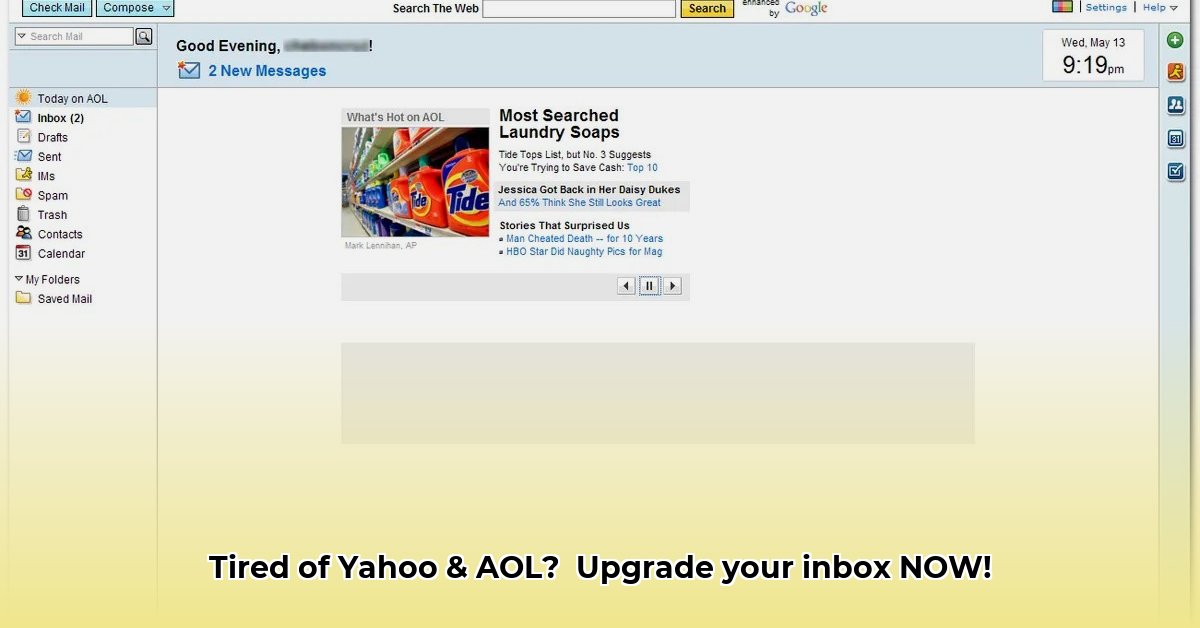Let’s face it: Yahoo and AOL email are so yesterday. Outdated, clunky, and maybe even a little insecure? Time for an upgrade! This guide will help you ditch the old and embrace the best modern email options. We’ll compare top contenders like Gmail, Outlook, and ProtonMail, looking at everything from security and storage to how easy they are to use. Think of it as your personal email makeover—we’ll walk you through finding the perfect fit and making the switch smoothly, so you can finally enjoy a truly awesome inbox.
Alternative to Yahoo and AOL: Finding Your Perfect Email in 2024
Let’s face it: Yahoo and AOL email are relics of the past. They’re showing their age with security worries, limited storage space, and interfaces that feel like they belong in a museum. It’s time for an upgrade! But with a million email services out there, choosing the right one can feel overwhelming. This guide breaks down the best alternatives, helping you find the perfect inbox for your needs in 2024 for enhanced email management.
What Makes a Great Email Service Today?
Before we dive into specific email providers, let’s talk about what really matters in an email service these days. We’re looking at several key factors for superior email experience:
- Security: Protecting your personal information is paramount, as your emails contain sensitive data; a robust email provider should have strong security measures against hackers and phishing. Look for features like two-factor authentication (2FA), end-to-end encryption, and strong spam filtering.
- Storage: Consider how many emails and attachments you typically save; some providers offer ample free storage, while others charge extra for more space. Estimate your storage needs and choose a provider that aligns with your usage.
- Features: Essential email features now extend beyond sending and receiving messages, with many providers integrating calendars, contact lists, task management tools, and other apps for a seamless user experience.
- Usability: Nobody wants an email provider that’s a confusing mess. The interface should be clean, intuitive and easy to use, regardless of your tech skills. Consider how easily you can access your emails from your phone, tablet, or computer with a responsive design.
- Integration: How smoothly does the email service play with your other apps and services for seamless integration? Seamless syncing with your calendar, cloud storage, and other productivity tools is a huge time-saver.
- Cost: Many excellent email providers offer free accounts with storage limitations. Others offer paid plans with enhanced features like extra storage and advanced security. Evaluate the cost versus the benefits to find the best value.
Gmail: The Go-To Choice for Many
Gmail, offered by Alphabet Inc. (NASDAQ:GOOG), is one of the most popular email services globally, boasting over 1.5 billion active users. It’s known for its clean and modern design, making it easy to navigate, even for beginners. It integrates flawlessly with other Google services like Google Calendar, Google Drive, and Google Docs. This makes managing your schedule, files, and emails a breeze. Gmail also boasts an effective spam filter, keeping your inbox free from junk mail. However, the free version does have storage limits, so consider this if you anticipate keeping a large archive of emails.
Pros:
- Excellent spam filtering keeps junk mail at bay.
- Seamless integration with Google’s other services.
- User-friendly interface.
- Smart Compose and Smart Reply features for efficient writing.
Cons:
- Free storage is capped at 15GB, shared across Google services. You’ll need a paid plan (Google One) if you need more space.
- Google collects user data for ad personalization. Adjust privacy settings for increased control.
Outlook: The Microsoft Powerhouse
Microsoft’s Outlook, part of Microsoft Corporation (NASDAQ:MSFT), is a natural choice if you’re already using Microsoft products like Windows or Office. It’s deeply integrated with the Microsoft ecosystem, making it a powerful tool for both personal and business use. Its calendar and contact management features are robust, offering extensive collaboration tools for enhanced productivity. However, some users find the interface a little cluttered compared to the clean simplicity of Gmail. Microsoft 365 Copilot enhances productivity by providing real-time assistance in email composition and organization.
Pros:
- Excellent contact and calendar management with robust scheduling features.
- Powerful features, particularly in paid plans (Microsoft 365).
- Great integration with Microsoft apps and services like Word, Excel, and PowerPoint.
- Offline access to emails and calendar.
Cons:
- Interface can feel cluttered compared to Gmail.
- Free version offers limited storage capacity (15 GB) and features.
- The full suite of features requires a Microsoft 365 subscription.
ProtonMail: Your Privacy Shield
If privacy is your top priority, ProtonMail is a strong contender. Founded by scientists and engineers from CERN, it’s built with end-to-end encryption (a system where only the sender and receiver can read the messages), meaning your messages are protected from prying eyes, even from ProtonMail itself. Based in Switzerland, it benefits from strict Swiss privacy laws. This makes it a very attractive alternative for those who are concerned about data security. However, it has fewer features and integrations compared to Gmail or Outlook.
Pros:
- Excellent end-to-end encryption for unmatched security.
- User-friendly interface, despite being focused on security.
- Zero-access encryption ensures even ProtonMail can’t read your emails.
- Ad-free and no data tracking.
Cons:
- Fewer features and integrations than other leading providers.
- Limited storage space on the free plan (500 MB).
- Can be more expensive than other options for higher storage tiers.
Zoho Mail: Built for Business
Zoho Mail is designed with businesses in mind. It packs powerful collaboration features, making it a solid choice for teams. It allows custom domain support, meaning you can use your business’s email address (e.g., [email protected]). While not as visually appealing as some others, Zoho offers reliable and feature-rich service for professional needs. Zoho Mail integrates with other Zoho business applications for enhanced productivity.
Pros:
- Robust collaboration features perfect for businesses.
- Custom domain support for professional branding.
- Strong administrative controls for managing accounts.
- Integration with Zoho CRM and other Zoho apps.
- Ad-free experience.
Cons:
- Might feel less user-friendly for solo users compared to others.
- Interface can be less modern than Gmail or Outlook.
iCloud Mail: Apple’s Ecosystem Integration
If you are deeply embedded in Apple’s world, iCloud Mail might be the perfect fit. It seamlessly integrates with other Apple devices and services, providing a cohesive experience. It’s a clean and simple email service, but it doesn’t offer the same range of advanced features as some of its competitors. It offers tight integration with features like Hide My Email for enhanced privacy.
Pros:
- Flawless integration with other Apple services like iCloud Drive, Calendar, and Contacts.
- Clean and user-friendly interface.
- Automatic setup on Apple devices.
- Hide My Email feature for creating disposable email addresses.
Cons:
- Limited storage on the free plan (5 GB, shared with other iCloud services).
- Not as feature-rich as other options like Gmail or Outlook.
- Best suited for Apple device users.
Picking the Right Email for You: A Quick Comparison
Here’s a summary of the key aspects of each email service and other options:
| Feature | Gmail | Outlook | ProtonMail | Zoho Mail | iCloud Mail |
|---|---|---|---|---|---|
| Security | Good, with 2FA and spam filtering | Good, with 2FA and phishing protection | Excellent, with end-to-end encryption | Good, with 2FA and anti-spam | Good, with 2FA and data encryption |
| Storage | 15 GB (shared with Google services) | 15 GB | 500 MB (free), up to 500 GB (paid) | 5 GB (free), up to 100 GB (paid) | 5 GB (shared with iCloud services) |
| Features | Excellent, with Smart Compose & Reply | Excellent, with calendar & task mgmt. | Good, focused on security | Excellent, with collaboration tools | Good, basic features |
| Usability | Excellent, intuitive interface | Good, feature-rich but can be cluttered | Excellent, clean and easy to use | Good, reliable but less modern UI | Excellent, simple and user-friendly |
| Integration | Excellent (Google) | Excellent (Microsoft) | Limited | Good (Zoho apps) | Excellent (Apple) |
| Cost | Free/Paid (Google One) | Free/Paid (Microsoft 365) | Free/Paid | Free/Paid | Free/Paid |
| Best For | General use, Google ecosystem users | Microsoft ecosystem users, professionals |
- How to Produce Electricity at Home for Energy Independence - January 29, 2026
- How To Create Electricity At Home For Energy Independence - January 28, 2026
- How to Make Electricity at Home Using Renewable Energy Sources - January 27, 2026
















